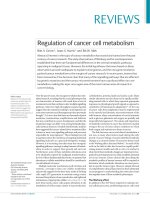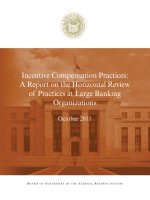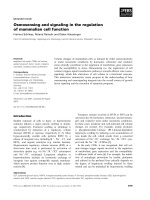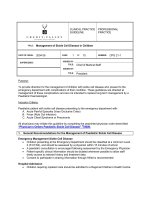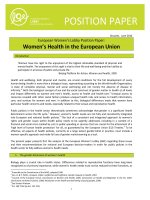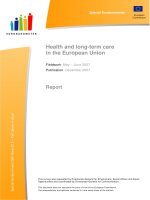Report on the Regulation of Reproductive Cell Donation in the European Union potx
Bạn đang xem bản rút gọn của tài liệu. Xem và tải ngay bản đầy đủ của tài liệu tại đây (441.85 KB, 21 trang )
EUROPEAN COMMISSION
Report on the Regulation of Reproductive
Cell Donation in the European Union
Report on the Regulation of Reproductive
Cell Donation in the European Union
- Results of Survey -
EUROPEAN COMMISSION
Directorate C - Public Health and Risk Assessment
C6 - Health measures
February 2006
In Spring 2005, the Health & Consumer Protection Directorate-General of the European
Commission carried out a survey on the regulatory status of reproductive cell donation in the
Member States. This Report presents the results of the survey.
The information contained in this publication does not necessarily reflect the opinion or the
position of the European Commission.
Neither the European Commission nor any person acting on its behalf is responsible for any
use that might be made of the following information.
Online information about the European Union in 20 languages is available at:
Further information on the Health & Consumer Protection Directorate-General is available at:
with free subscription to the e-
news service of the Directorate-General available under:
© European Communities, 2006
Reproduction is authorised, except for commercial purposes, provided the source is acknowledged.
Printed by the services of the European Commission.
1
TABLE OF CONTENTS
1. BACKGROUND 2
2. CORE OBSERVATIONS FROM THE SURVEY 3
3. SUMMARY OF QUESTIONNAIRE RESPONSES 7
4. REPRODUCTIVE CELL REGULATIONS & SYSTEMS OF COMPENSATION 10
5. DONOR CONSENT FOR EGG CELLS 12
6. IMPORTATION & EXPORTATION OF REPRODUCTIVE CELLS 14
7. STATISTICAL DATA ON REPRODUCTIVE CELL DONATION 16
2
1. BACKGROUND
Human tissues and cells play a vital role in healthcare. Their therapeutic use continues to
increase. Over the past decade, the interchange of these human substances both within and
between Europe and third countries has intensified. The fact that the use of these tissues and
cells can result in the transmission of diseases and illegal trafficking, has focused attention on
the need for enhanced safety and security measures. The Commission has ardently
encouraged the promotion of donation programmes which ensure the high quality and safety
of tissue and cell donation.
In addition, the Commission considers it essential to encourage Member States to incorporate
into their national legislation the principle of voluntary and unpaid donation. It regards the
paying of substantial fees to obtain human egg cells to be against the principles expressed in
the Directive 2004/23/EC on Tissues & Cells, which seeks to ensure the quality and safety
aspects of human tissues and cells used in therapies in the EU and provides for a mechanism
that will allow for a coherent approach to the authorisation of imports and exports.
The media reported in December 2004 on a Romanian clinic specialising in egg cell donation
to EU nationals in return for financial compensation. Given the relative poverty of the
donors, it was suspected that the price paid for egg cells might act as an incentive to donation.
The Tissues & Cells Directive, Article 12, clearly states that donors may receive
compensation, but this is strictly limited to making good the expenses and inconveniences
related to the donation procedure. In this case, Member States define the conditions under
which the compensation may be granted.
The European Parliament discussed the case in March 2005 and adopted a resolution
1
on
further action. The Parliament called on the Commission to collect national information on
the regulatory situation governing reproductive cell donation.
In March 2005, the Commission requested the 25 Member States to complete a questionnaire
on national legislation pertaining to reproductive cell donation. Information was also
requested on the activities and volume of reproductive cell interchange, including past and
present imports and exports to and from third countries, and on any suspect or unauthorised
actions. Information was received from 23 Member States. The draft report was sent back to
Member States for verification in January 2006.
This report sets out the results of the survey. Chapter 2 covers the principles of
confidentiality, anonymity and non-remuneration in the donation of reproductive cells, as
well as donor compensation, consent for egg cell donations and the importation and
exportation of reproductive cells. A tabulated summary of the answers is given in Chapter 3.
The report also lays out the details provided by the Member States from Chapters 4-7.
1
European Parliament Resolution on the trade in human egg cells (P6_TA(2005)0074).
3
2. CORE OBSERVATIONS FROM THE SURVEY
Please note that some survey questions concerned reproductive cells in general and others
focused specifically on reproductive egg cells.
One Member State expressly prohibits reproductive cell donation, unless that donation is
within a homologous couple. This country has therefore been omitted from the core
observations.
2.1. Principles governing the Donation of Reproductive Cells
The majority of Member States have legislation in respect of:
• Confidentiality (measures ensuring that all data collated, including genetic information,
has been rendered anonymous so that the donor and the recipient are no longer
identifiable);
• Anonymity (measures regulating the disclosure of the identity of the donor. This could
mean either that the donor must by law remain anonymous or, on the contrary, that the
donor must by law forego his/her anonymity.);
• Non-Remuneration for the donation (measures preventing organ trade or trafficking).
Figure 1
Confidentiality Anonymity Non-Remuneration
14
1
3
4
15
1
1
6
15
2
1
4
Regulated by Law
Binding Guidelines
Non-Binding Guidelines
Not Regulated
Prohibited by Law
Unclear
4
2.2. Donor Compensation
11 Member States have some form of compensation system in place for cell donors, although
the regulation varies. For the 8 countries that do not technically permit compensatory
payment to donors, the regulation again varies. 3 countries were unable to answer the
question as to whether donors receive compensation because they have no information on
compensatory schemes and no regulations in place.
Figure 2
Is there Compensation for Reproductive Cell Donors & How is this Regulated?
Yes
No
2.3. Consent for Egg Cell Donations
13 Member States have regulations in place to regulate donor consent, while 6 do not.
Egg cell donation is prohibited by law in two Member States (excluding the country in which
reproductive cell donation is illegal). These countries are not included in Figure 3.
4
1
4
2
5
1
2
Regulated by Law
Binding Guidelines
Non-Binding Guidelines
Not Regulated
Prohibited by Law
Unclear
5
12
1
1
6
Figure 3
Regulation of Egg Cell Donor Consent
2.4. Importation & Exportation of Reproductive Cells
The importation and exportation of egg cells remains unregulated in the majority of countries.
Figure 4
Regulation of the Importation / Exportation of Reproductive Egg Cells
Regulated by Law
Binding Guidelines
Non-Binding Guidelines
Not Regulated
Prohibited by Law
Unclear
Regulated by Law
Binding Guidelines
Non-Binding Guidelines
Not Regulated
Prohibited by Law
Unclear
6
3
1
12
6
For reproductive cells in general, no serious report or suspicion of unauthorised, illegal or
otherwise suspect import/export of these human cells has been detected in any of the Member
States.
Note: 11 Member States have provided statistical data on sperm and egg cell importation
and/or exportation, however much of this is incomplete. No data is available for countries
where reproductive cell imports and/or exports are unregulated.
7
3. SUMMARY OF QUESTIONNAIRE RESPONSES
3.1. Status of Reproductive Cell Donation
Y Yes U Unclear response
N No P Prohibited by Law
L It is explicitly included in the law or government rules and is binding no data No data available
G It is included in national or international organisation guidelines and is binding n/a Not applicable
GNO It is recommended by national or international organisations guidelines but it is not binding no ans No answer
NR Not regulated
AT BE CZ DE DK EE EL ES FI FR HU IE IT LT LU LV MT NL PL SE SI SK UK‡
What is the Status of Reproductive Cell
Donation?
LL+GGLLLLLLLLNR
P**
NR NR L
GNO+NR LNRLLL+GL
Confidentiality
LGGLLLLLLLLNRn/a NRNRLGNOLNRLLL+GL
Anonymity
L° GNO G L L L L+G L L+NR* L L NR n/a NR NR L NR L NR L L L+G L††
Non-Remuneration
LL GGNOGNOLLLLLLNRn/a NRNRLGNO LNRLLLL
° By law donors cannot be anonymous.
* See under FI on page 10 for further details. At present, the principles of donor anonymity and compensation are regulated by law for medical research, but are not regulated in terms of anonymity,
and are regulated by non-binding guidelines in terms of compensatory procedure for infertility treatments.
The type of regulation for infertility treatment rather than for medical research was used for the charts on pages 3-5.
** Reproductive cell donation is prohibited by law, except for donations within homologous couples.
‡ See under UK on pages 16-17 for more detailed information.
†† Anonymity has been removed from new donors registering with a licensed clinic from 1 April 2005.
8
3.2. Regulations on Donor Compensation, Consent & Imports/Exports of Reproductive Cells
Y Yes U Unclear response
N No P Prohibited by Law
L It is explicitly included in the law or government rules and is binding no data No data available
G It is included in national or international organisation guidelines and is binding n/a Not applicable
GNO It is recommended by national or international organisations guidelines but it is not binding no ans No answer
NR Not regulated
AT BE CZ DE DK EE EL ES FI FR HU IE IT LT LU LV MT NL PL SE SI SK UK‡
Do Reproductive Cell
Donors receive
Compensation?
NYYY YYNYY NYY+Nn/aNNRYY+NN Y+NN N Y Y
How is this Regulated?
NR GNO NR GNO GNO L L G
L+GNO*
L L NR n/a NR NR NR N+GNO L NR L? L L L+GNO
Is Egg Cell
Donation prohibited by Law?
YNNYª NNNNN NNNn/aNRNRNNRNNRNNN N
How is Consent for Egg Cell
Donations
Regulated?
n/a NRGn/aLLLLL no ansLNRn/aNRNRLNRLNRLLL+GL
What is the Status of Egg Cell
Imports/Exports?
P NRNRNRL¹ NRL NR₫ NR L L NR n/a NR NR P² NR NR NR L P
U³
L
Reports of Unauthorised Imports or
Exports of Reproductive Cells
?
no dataN no dataNNN NNN no ansNno dataNNNN N Y†NN N N N
ª The transfer of a donated cell into another woman is prohibited under the Embryo Protection Act.
¹ However, the export of embryos and non-fertilised eggs is prohibited by law.
₫ The import and export of egg cells is not specifically regulated by any legal text. However, the use of frozen eggs which would be a pre-requisite in the trade of egg cells is prohibited
by law, and permitted only in cases included in research projects.
² Unless provided for by international agreements ratified by Parliament.
³ None of the 5 IVF centres provides for the import or export of reproductive cells.
† There are offers on the internet.
9
3.3. Data Received on Nationwide Reproductive Cell Donations
Only 11 Member States provided information on cell donation within their own country for the
years 2003 and 2004.
The number of donors is given in brackets.
The number of donations is given outside the brackets.
‡ See under UK on pages 16-17 for more detailed information *** estimates from the Spanish Society of Fertility (SSF)
3.4. Data Received on Imports/Exports of Reproductive Cells
Only the UK provided detailed statistical data on reproductive cells imports and exports (please refer
to the statistical information provided on pages 16-17). Of the remaining 22 survey respondents, 3
countries have at some time received imports of sperm donations: Germany - from Denmark, the
Netherlands and the US; Finland - from Denmark and the US; Spain - from the US. No figures were
provided.
Sperm Cells
Member States who reported imports but no figures given
ES, DE, FI
Member States where there were no sperm imports/exports
AT, BE, FI, HU, LT, LU, LV, PL, SI, SK
Egg Cells
Member States where there were no egg cell imports/exports
AT,
BE, DE, DK, FI, HU, LT, LU, LV, PL, SI, SK
Member States where no figures are currently available on
sperm imports/exports
CZ, DE, DK, EE, EL, ES, FR, IE, IT, MT, NL, SE
Member States where no figures are currently available on
egg cell imports/exports
CZ, EE, EL, ES, FR, IE, IT, MT, NL, SE
AT CZ EE ES FI FR HU NL SI SK UK‡
Egg (Donors/) Donations
inside own country 2003
- 7783 20-30 2900*** no data (161) 10 (70) 100 (5) 5 30 (1100-1300)
2004
no data 8865 30-40 2900*** c.700 no data 10 (70) 100 (9) 10 20 no data
Sperm (Donors/) Donations
inside own country 2003
444 no data 75 5600*** (c.10-15) (352) 750 (460) (15) 70 (300) 500 (226)
2004
758 no data 100 5600*** (c.10-15) no data 750 (460) (26) 105 (300) 500 no data
10
4. R
EPRODUCTIVE CELL REGULATIONS & SYSTEMS OF COMPENSATION
Member
State
Status of Reproductive Cell Donation & Compensation Measures
BE
Donor compensation for reproductive cells is indicated by Non-Binding Guidelines according to the
Federal Consultative Board for Bioethics, Advice No. 27, 2004, Code de Déontologie Médicale,
Ordre des Medecins.
CZ
The principles driving the donation of reproductive cells are regulated by Binding Guidelines according
to Measure OP-066.18.11.82 of the Ministry of Health, which sets out the conditions for artificial
fertilisation. Egg cell donation should only be carried out at centres with more than 400 IVF cycles per
year.
Sperm donors receive a reimbursement of between 300-600 Czech Crowns. This covers wage losses
only. Egg cell donors receive compensation for both wage and time disruption. Discomfort during the
medical procedure is also taken into account. Women receive between 8,000 and 15,000 Czech Crowns.
However, these sums are neither officially recommended nor legally binding.
DE
Sperm donors receive compensation of 50-150 EUR for the examination and use of their time. Egg cell
donation is prohibited by law.
DK
Sperm donors receive only a small compensation for the use of their time, expenses for transportation,
etc.
EE The majority of donors provide gametes to infertile couples for altruistic reasons. The Artificial
Insemination & Embryo Protection Act, adopted in 1997 (and subsequently amended), regulates the
right of the donor to receive compensation. The compensation is small and only covers certain expenses
related to the process of donation (such as travel/accommodation).
EL
There is no donor compensation except for compensation for the cost of the procedure of isolation and
conservation of gametes in cryobanks.
ES
The amount of ‘economic’ compensation was proposed in 1998 (30 € for semen donation and 600 € for
egg donation), but never made binding. Since then the amount has probably changed. Spain is in the
process of establishing new laws which envisage a periodic revision of this concept. For egg donors,
donation without economic compensation does exist, but in these cases indirect compensation is
deployed. This would take the shape of priority care assurance if these female donors are, at the same
time, users of assisted donation. No conclusions have so far been adopted in the National Commission
for Assisted Human Reproduction.
FI
The donation of reproductive cells is regulated under general legislation concerning health care and
protection of privacy. Finland does not yet have specific legislation on infertility treatments. Detailed
provisions on the use of reproductive cells for research purposes are stated in the Medical Research Act
(488/1999). The Act on the Medical Use of Human Organs & Tissues (101/2001) does not regulate
reproductive cells but mentions that the use of reproductive cells for infertility treatment will be
regulated separately. Finland does not yet have legislation on infertility treatment. A proposal for such
an act is currently being prepared in the Ministry of Justice and the Government’s proposal should be
submitted to the Parliament before the end of 2005.
In terms of donor anonymity, in practice the sperm or egg cell donors can decide whether or not they
would like to be registered (if registered the identity of the donor can be disclosed to the child when
he/she is 18 years old). The egg cell donor is treated as a patient in the health care unit, and her details
are recorded in the patient records in accordance with normal procedures. The general principle in all
Finish healthcare legislation is that no fee is paid to the patients, research subjects, etc., but expenses can
be reimbursed. Ovary and sperm donors in practice receive a reimbursement to cover their expenses.
Practices may vary according to the clinic.
11
FR
Donors receive no compensation besides the reimbursement of travel expenses.
HU
Parliamentary Act No. CLIV of 1997 on Health, Section 170 requires that reproductive cell donors
be compensated. Section 170/3:
“remuneration for donating reproductive cells shall not be requested or provided. Donation-related
necessary and certified costs of a donor, including loss of income, shall be reimbursed within the sphere
and under the conditions set forth by Minister of Health Decree.”
IT Laws on the Subject of Medically-Assisted Procreation, 19.02.2004, n°40 (published in G.U.
24.02.2004, n°45) only permits reproductive cell donation within homologous male-female couples who
are over the age of 18 and either married or living together. Article 4, Paragraph 3 of this Law
expressly prohibits external donations, thereby prohibiting everything associated with or following from
the donation of gametes. Article 12 of the Law provides sanctions, whether civil or penal, for anyone
who uses external gametes or organises, carries out or publicises the commercialisation of gametes,
embryos or surrogate mother-ships.
A Decree of 7 October 2005 (published in G.U. 03.12.05) set up a National Registry of authorised
institutions that can apply techniques of medically-assisted procreation. This Registry is held by the
National Institute of Health (L’Istituto Superiore di Sanità).
MT
Legislation on embryo protection and in vitro fertilisation is currently being drafted. Malta is also due
to sign the Oviedo Convention on Human Rights and Biomedicine which supports the protection of
human rights and dignity with regard to the application of biology and medicine.
PL
There are no legal or regulatory provisions for reproductive cell donation. However, the Polish Health
Ministry is currently working on a system of registration for the bodies acting in the field of
donation/storage of egg cells and sperm.
SI Article 10 of the Law governing the status of reproductive cell donation stipulates that the:
“Giving and receiving remuneration or any other benefits as compensation for donated reproductive
cells shall not be permitted. Contracts to this effect shall be null and void. A male or female donor of
reproductive cells shall be entitled to the reimbursement of costs associated with his/her arrival to, stay
in and return from a bio-medically-assisted reproduction (hereinafter referred to as BMAR) centre, as
well as with the examinations and reproductive cell collecting.”
UK
Section 12 of the Human Fertilisation and Embryology Act 1990 states that that no money or other
benefit shall be given or received in respect of any supply of gametes or embryos unless authorised by
directions. A direction to licensed clinics is issued by the Human Fertilisation and Embryology
Authority. The current direction is that gamete donors must be paid no more that £15 for each donation
plus reasonable expenses, which the HFEA gives as guidance.
12
5. D
ONOR CONSENT FOR EGG CELLS
Member
State
Donor Consent
BE
Donor consent is not regulated, but informal consent is noted in the patient’s medical record.
DE Donor consent is regulated by law. According to § 1 Para. 1, No. 1 of the Embryo Protection Act,
anyone who attempts to artificially fertilise an egg without the consent of the woman, whose egg is to be
fertilised, and the man, whose sperm cell will be used for fertilisation, will be punished with up to three
years imprisonment or a fine. A person who takes an unfertilised egg cell from a woman in order to
transfer it to another women shall likewise be guilty of assistance to a criminal act (§ 27, Criminal
Code).
DK
Donor consent is regulated by law. There has to be informed consent given by the donor and a
statement that the donor has understood the conditions of the donation.
EE Donor consent requirement is foreseen in Article 25 Paragraph 1 of the Artificial Insemination &
Embryo Protection Act (RT I 1997, 51, 824; 2003, 18, 102). General requirements stipulated in the
Law of Obligations Act (RT¹ I 2001, 81, 487, subsequently amended) on the provision of health
services, especially on informed consent (duty to inform the patient, possibility to require information in
written format as well, the right to withdraw consent within a reasonable period) also apply.
Extract from the Artificial Insemination & Embryo Protection Act (RT I 1997, 51, 824; 2003, 18,
102):
§25 - Gamete Donation.
(1) Any adult man of up to 40 years of age and any adult woman of up to 35 years of age (except
for the case provided for in subsection 23 (3), who is mentally and physically healthy, has
consented to donate his or her gametes for the purposes of artificial insemination and has
entered into a corresponding contract with a provider of specialised medical care who
organises artificial insemination, may be a gamete donor.
EL
Donor consent is regulated by law. Those who wish to participate in methods of medically-assisted
reproduction are informed in detail by the medical staff in Medically-Assisted Procreation Units. They
receive thorough information on the entire procedure, the alternatives and the expected results, as well
as the possible risks. This information covers all social, ethical, legal and financial aspects that cell
reproduction entails. The provision of all the above-mentioned information is a presupposition for the
written consent provided by the relevant legislation. The Competent Authority identifies the necessary
data which should be included in the information and consent forms. These forms are submitted to the
Medically-Assisted Procreation Units and are kept in the donors’ medical files.
ES
Donor consent is regulated by law (Royal Decree 412/1996). Donation protocol includes consent and
check-ups for certain conditions as well as analytical tests to monitor health status.
FI
There are no specific provisions on donor consent for egg cell donation. Since egg cell donors are
treated as patients, patient legislation applies. Although the Act of Status and Rights of Patients
requires that mutual understanding be a requisite for patient treatment, explicit consent of the patient in
everyday healthcare procedures is not required.
HU
Parliamentary Act No. CLIV of 1997 on Health, Section 171 (amended taking effect from 1 January
2006) states that :
“(3) The donation set forth under Subsection (2) shall occur by providing a written declaration of
donation to the health service provider or research facility authorized to accept reproductive cells and
by appearing in person at the institution for harvesting the substance containing the reproductive cells.
When donating the cells for a reproduction procedure, the donor’s declaration shall contain the name
of the donor (family and given name, maiden name), mother’s maiden name, address, date of birth,
gender, physical description, and all illnesses of which the donor is aware.”
13
HU
(cont.)
“(4) When cells are donated for a reproductive procedure, the donation set forth under Subsection (2)
may occur for the use of a specific recipient provided that the following requirements are jointly met:
a) the donor is :
aa) a close relative or
ab) a collateral relative or
ac) the spouse (cohabiting partner) of the sibling or
ad) a close relative (except for a lineal kin and a sibling) of the spouse (cohabiting partner) or
ae) the spouse (cohabiting partner) of the sibling of the spouse (cohabiting partner)
of the recipient and complies with the provisions set forth under Subsection (1);
b) the donor offers the cells exclusively for the use of the recipient specified in the declaration of
donation;
c) the declaration of donation includes – beyond the provisions set forth in Subsection (3) – the written
declaration of consent of the donor and the unanimous statement of the donor and the recipient made
with both of them present confirming that the donation occurs specifically for the recipient and that it
takes place without consideration in return, force, duress, coercion or deception. The donor may state
in a declaration that the cells not used for the specified recipient may be used in a way that is unsuitable
for identification.
“(5) The health service provider to which a donation has been offered, prior to harvesting the
reproductive cells being donated for reproductive procedures, shall see to it that the donor, who has
appeared in person, undergoes a preliminary medical examination, and shall orally inform the donor of
the purpose and conditions of the donation. When appearing in person, the donor shall credibly certify
the correctness of the personal data submitted.”
“(6) A donor declaration and preliminary medical examination as set forth in Subsections (3) and (4)
are necessary only prior to the first harvesting of reproductive cells, if the donations of reproductive
cells are made repeatedly, on an ongoing basis. The ongoing nature of the donations does not exempt
the donor from providing information on any known illnesses.”
IT Donor consent is regulated by the Laws on the Subject of Medically-Assisted Procreation,
19.02.2004, n°40 (published in G.U. 24.02.2004, n°45) which only permits homologous donations
(donation within the same couple).
LV
Donor consent is regulated by law. The donor may revoke his/her consent for use of gametes prior to
treatment commencement.
NL Donor consent is regulated by the Embryo Law Section 5.
SE
Written consent is required for reproductive cell donation. The donor may withdraw consent up until the
time of fertilization.
SI Article 25 of the Law governing the status of reproductive cell donation states:
“Donation of spermatozoa and unfertilised oocytes may be carried out solely on the basis of a written
consent of the female or male donor. Written consent forms shall be issued by the minister responsible
for health on the recommendation of the National BMAR Commission.
Prior to issuing a written consent to reproductive cell donation, the centre has to inform the female or
male donor about the legal effects of her or his donation, as well as with their legal status towards the
child conceived by BMAR procedure with the donated reproductive cells. The centre has the obligation
to inform them about the purpose of their personal data collecting and processing, and explain them that
these are protected as professional secrecy referred to in the first paragraph of Article 18 of this Act.”
SK
Informed consent must be given by the donor and approved and signed by notary and/or a witness.
UK
Schedule 3 of the Human Fertilisation and Embryology Act 1990 requires that people give informed
written consent to the use of their gametes for the treatment of others. They must be given an
opportunity to receive proper counselling about the implications of donation. The donor can withdraw
consent up to the point when the gemmates are used in the treatment.
14
6. I
MPORTATION & EXPORTATION OF REPRODUCTIVE CELLS
Member
State
Imports / Exports of Egg Cells
BE
Although the import/export of egg cells is unregulated, the use of embryos or stem cells reproductive
cells for commercial purposes is prohibited by law.
2
DE Import authorisation for sperm is required for importations from third countries according to the Drug
Law. Inspections on this regulation were performed at the beginning of September 2005.
Trade in human ova is not explicitly governed by the Embryo protection Act.
EL
The import and export of human germ cells and fertilized ova, including their biological components
and derivative products, is free from and to all EU member-states. The import and export to and from
third parties is permitted on certain conditions and only after permission has been received from the
Competent Authority. This Authority will take into account the existence of control mechanisms,
quality certificates, safety standards and the competent legislation of the country of origin or destination.
ES
The import and export of egg cells is not specifically regulated by any legal text. However, the use of
frozen eggs which would be a pre-requisite in the trade of egg cells is prohibited by law, and permitted
only in cases included in research projects. This is specified in Royal Decree 120/ 31.01.2003. At
present only 1 project is currently authorised. A new law envisages the generalisation of these practices,
with previous and explicit authorisation by the establishment.
Frozen semen imports are authorised. In this instance the External Health Service (Sanidad Exterior)
demands the certification from the health authorities of the origin country that the requisites required by
Spanish law have been fulfilled, on completeness (by the sample) of requisites asked to donors by our
law. A separated part of the sample in order to defreeze and realise analytical tests to semen is also
required.
FI
In the past sperm donations have been received from Denmark and the US.
FR
For the import or export of reproductive cells, authorisation from the Health Ministry is required for
each demand. Only an authorised laboratory may receive the product. The import or export of cells may
also be authorised if patients (such as a homosexual couple) who are travelling abroad require
reproductive cells.
2
Law relative to the protection of embryos conceived in vitro, ‘Belgian Law Journal’, 11.05.2003.
15
HU Parliamentary Act No. CLIV of 1997 on Health authorises reproductive cell importation and
exportation under Article 243. § (6).
3
“Organs and tissue shall be transported from the Republic of Hungary to another country or from
another country to the Republic of Hungary only
a) for transplant,
b) for treatment of the patient transporting the organ or tissue,
c) for diagnostic purposes or
d) for research
if this is made possible by an international agreement or covenant. Another condition for transporting
an organ to another country under Paragraph a), is that there shall be no suitable recipient within the
borders of the Republic of Hungary.
(7)
4
The prerequisite for the validity of a contract concerning the transport of organs or tissue, other
than blood and blood products, to another country or from another country to Hungary, other than
when said contract is in the form of an interstate or intergovernmental agreement or covenant, is the
agreement of the Executive Office of the Chief Medical Officer. The CMO’s Executive Office shall deny
its agreement if it can be determined that the contract involves profiting. There is no legal recourse
against a decision of the CMO’s Executive Office through government administration channels, but it
may be challenged through the courts. The CMO’s Executive Office shall keep a registry of said
contracts or agreements, other than interstate or intergovernmental agreements or covenants, which
shall be reported to it by the Hungarian party to said contracts or agreements.”
LV According to the Sexual & Reproductive Health Law, it is prohibited to import or export donor
gametes or embryos if it is not otherwise provided for by international agreements ratified by the Saeima
(Parliament).
SE
Egg cell importation and exportation is regulated by law. Frozen sperm may not be imported without the
permission of the National Board of Health and Welfare.
SI The import and export of egg cells is prohibited by Law. This is explicitly set out in Article 37 of the
Law governing the status of reproductive cell donation:
“It shall not be allowed to intervene in the collecting, storage and use of spermatozoa, unfertilised
oocytes and early embryos. Trade in spermatozoa, unfertilised oocytes and early embryos shall not be
allowed.”
SK
None of the 5 IVF Clinics in the Slovak Republic provides for the import or export of reproductive cells.
UK
Section 24 of the Human Fertilisation and Embryology Act 1990 provides that Directions (from the
HFEA) may authorise any person to whom a licence applies to receive gametes or embryos from outside
the UK or to send gametes or embryos outside the UK in such circumstances and subject to such
conditions as may be specified in Directions. The HFEA has directed that the specific consent of people
providing gametes must be obtained for the export of the gametes.
3
Established by Subsection (1), Section 21, Act LXXI of 1999. In force as of 1 August 1999.
4
Inserted by Subsection (2), Section 21, Act LXXI of 1999. In force as of 1 August 1999. For its application, cf. Subsection (1), Section 24 of
the same law.
16
7. STATISTICAL DATA ON REPRODUCTIVE CELL DONATION
Member
State
Statistical Data
BE
There were 580 IVF-ICSI cycles of egg donation in 2002, but otherwise no more data is available.
DE
During 2003/2004 the number of sperm donors is not known, although it is estimated at about 1000
pregnancies after AID each year.
EL
There is no data available on the activities in 2003/04 due to lack of relevant legislation in place to
monitor the figures.
ES
There is no data available on sperm donations. However Spanish customs agents have requested
information from the US on the possibility of importation from US semen banks. But since they have
been in contact less than 5 times, it is believed that import is rare. There is no available data on sperm
exports but the Spanish Society of Fertility considers that there have been no cases.
FI
There are 17 infertility clinics (public and/or private) in Finland. The Sperm bank of the Family
Federation (Väestöliito) has approximately 10-15 donors per year, excluding partner donors. Unclear
legislation has reduced the number of donors in recent years.
UK
Imports
No egg cells were imported during 2003. However, 8 Special Directions were issued for the import of
embryos. All were the patients’ own embryos created from their own gametes in another country
(Belgium, South Africa, NZ, Australia, the US.)
No egg cells were imported during 2004. However, 35 Special Directions were issued for the import of
embryos; 11 were created from the couple’s own gametes in another country (Belgium, Thailand, NZ,
USA, Ireland, Germany, Australia, Singapore); 23 were imports of embryos created from donor eggs
either in the US or Romania. One was for a couple travelling from Italy to the UK to have surrogacy
(illegal in Italy).
34 Special Directions were issued (although one was cancelled) for sperm imports in 2003. 6 were for
the import of the male partner's own sperm for logistical reasons. 2 additional SDs were issued for
import of embryos included permission to import partner's sperm. 27 were for the import of donor sperm
from the US or Denmark. Reasons for these imports were patients wanting sperm from identifiable
donors, wanting anonymous donors but with more information/ability to choose characteristics, or not
being able to find suitable sperm in the UK. 1 was for the import of donor sperm for a surrogacy
arrangement not legal in the country of origin (Ireland).
75 Special Directions were issued for the import of sperm in 2004. 12 were for the import of the male
partner's own sperm for logistical reasons or because posthumous storage is now allowed in the country
of origin (Ireland). Countries of origin were France, Turkey, Germany, United Arab Emirates, USA,
Ireland and Australia. 63 were for the import of donor sperm from USA, Denmark, Australia, France or
Israel (the vast majority were from Denmark or USA). Reasons for these imports were patients wanting
sperm from identifiable donors, wanting anonymous donors but with more information/ability to choose
characteristics, or not being able to find suitable sperm in the UK.
Exports
19 Special Directions were issued for the export of embryos in 2003. All but one were requested
because the patient(s) had relocated and/or wanted to continue treatment abroad. The other was for
PGD to be performed in the US. Destination countries were Australia, the US, Canada, France, La
Réunion, Belgium, Cyprus and Mexico.
15 Special Directions were issued for the export of embryos in 2004. 14 were requested because the
patient(s) had relocated and/or wanted to continue treatment abroad. Destination countries were
Belgium, the US, Italy, Australia, France and New Zealand. One was requested for PGD in the US.
17
UK
(cont.)
1 Special Direction was issued for the export of sperm (to the US) in 2003. This was for the patient’s
own use.
5 Special Directions were issued for the export of donor sperm in 2004. Destination countries were
Ghana, Australia, USA and Belgium. 1 Special Direction was issued for the export of own sperm. 81
General Directions were issued where sperm was exported to New Zealand, Denmark, USA, Romania,
Spain, Italy, Guernsey, West Indies, Switzerland, Cyprus, Hong Kong, Belgium, Panama and Ireland.
Report on the Regulation of
Reproductive Cell Donation in the EU
Human tissues and cells play a vital role in healthcare. Their
therapeutic use continues to increase. Over the past decade, the
interchange of these human substances both within and between
Europe and third countries has intensified.
Directive 2004/23/EC on Tissues & Cells seeks to ensure the
quality and safety aspects of human tissues and cells used in
therapies in the EU, and provides for a mechanism that will
allow for a coherent approach to the authorisation of imports
and exports.
In Spring 2005, the Commission carried out a survey among the
Member States on the regulatory status of reproductive cell
donation.
This report sets out the findings on the principles of
confidentiality, anonymity and non-remuneration in the
donation of reproductive cells, as well as donor compensation,
consent for egg cell donations and the importation and
exportation of reproductive cells. The report also lays out the
details provided by the Member States.
2006
European Commission
Health & Consumer Protection Directorate-General


